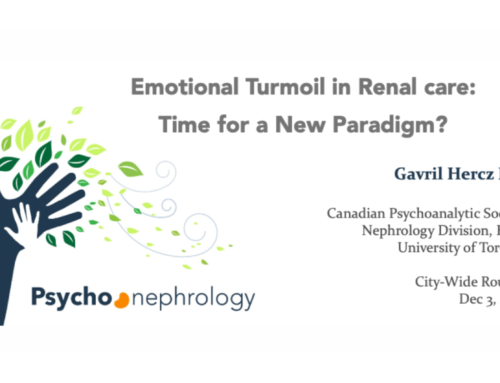
In Conversation Series
Janet Wright with Dr. Gavril Hercz
As a nephrologist and psychotherapist, I believe it is important to shed more light on the emotional impact of chronic illness, like polycystic kidney disease (PKD), on patients and families. Last year, during the “In Conversation Series”, we shared the 2018 Toronto PKD scientific conference video, in which Ms. Janet Wright shared her experiences and recommendations in enhancing clinical care and the patient experience. During a medical education event, we tried a new approach, where instead of trying to convey information with a PowerPoint presentation, I sat with Janet in front of a live audience, to give a vivid voice to the issues faced by patients navigating significant life events. This year, I again had the opportunity to discuss a patient’s point of view with Ms. Janet Wright, where we conversed at length about her life with kidney disease, which can be a “rocky road with cliffs along the way”
She came to the interview with her “new Kidney”, having received an uncommon transplant just a few days before. She received this kidney from an altruistic donor and felt incredibly grateful both to the donor and for her “new life”.
We discussed how difficult it is for a patient to adjust emotionally when he/ she is moved from one specialist’s care to another when the transplant is arranged. Even before that, when different donors are being evaluated as a potential match, it can be very unnerving to wait for the results and it is common to feel disappointed when the tests come back negative. All those hopes can be shattered with just one phone call. Janet also felt the weight of disappointment when her second donor was declined, pushing her to a new level of despair.
We spoke more about her experience of being transferred from her familiar nephrologists, under whose care she has felt secure for a very long time, to a whole new kidney care clinic with a very large team, where she was to be taken care of during her transplant. She said that though she was informed of what to expect during this transition, the guidebook that was given to her did not fully prepare her for the emotional turmoil she would face.
Another very important topic that was raised during this discussion was the lack of emotional support for the donors. The patients, part of a hospital program, can expect emotional support from their friends, family and the healthcare team. But the donors, who are otherwise healthy, are not considered candidates for emotional support. Janet talked about her brother and her friend, both of whom were willing to donate a kidney to her, whose hopes were shattered when they were informed through a call that they would not be compatible matches. They felt deflated that they failed in saving their loved one and had no structured emotional help during that period.
Janet discussed how people assume that once you receive a kidney transplant people assume you are cured. However, she describes it more like life support, because people with polycystic kidney disease are still impacted by the illness involving other organs, such as the liver. Sometimes people (including healthcare teams) can say things which can carry a very different meaning, often hurtful, which is not appreciated.
I talked about the emotional turbulence a patient may face when transitioning from life within a healthy body to one dealing with chronic illness one, and again on moving to a life lived with a kidney transplant. Janet had prepared herself, for the last 30 years, to live a part of her life on dialysis. Getting a transplant was a surprise that she wasn’t ready for emotionally. Fear, loneliness, anxiety, and uncertainties can diminish positive emotions. There is a need for all of us, including clinicians, to look beyond the obvious, beyond things that can be measured or seen, and recognize the emotional impact of coping with both everyday life and momentous change.
You can watch the complete conversation here.
About the Author
Dr Gavril Hercz
Dr. Gavril Hercz is a nephrologist at Humber River Health and Associate Professor of Medicine, University of Toronto. He completed his psychoanalytic training at the Toronto Psychoanalytic Institute and is a member of the Canadian Psychoanalytic Society. His major area of interest is the impact of physical illness on patients, families, and caregivers.
Janet Wright with Dr. Gavril Hercz As a nephrologist and psychotherapist, I believe it is important to shed more light on the emotional impact of chronic illness, like polycystic kidney [...]



